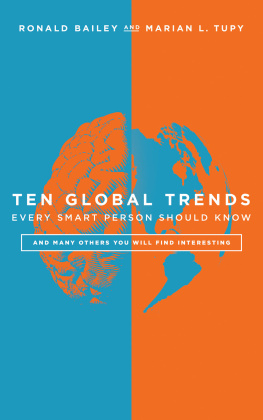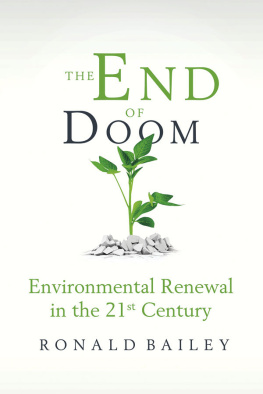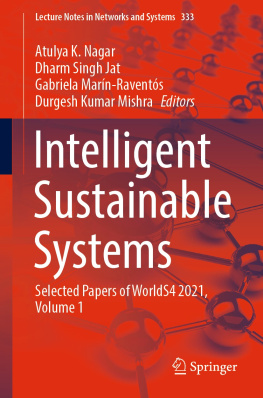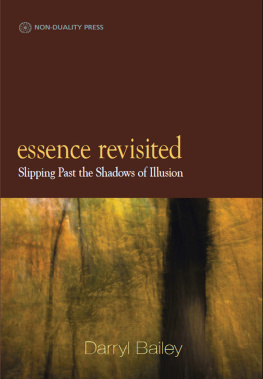Ronald Bailey - Ten Global Trends Every Smart Person Should Know
Here you can read online Ronald Bailey - Ten Global Trends Every Smart Person Should Know full text of the book (entire story) in english for free. Download pdf and epub, get meaning, cover and reviews about this ebook. year: 2020, publisher: Cato Institute, genre: Politics. Description of the work, (preface) as well as reviews are available. Best literature library LitArk.com created for fans of good reading and offers a wide selection of genres:
Romance novel
Science fiction
Adventure
Detective
Science
History
Home and family
Prose
Art
Politics
Computer
Non-fiction
Religion
Business
Children
Humor
Choose a favorite category and find really read worthwhile books. Enjoy immersion in the world of imagination, feel the emotions of the characters or learn something new for yourself, make an fascinating discovery.
- Book:Ten Global Trends Every Smart Person Should Know
- Author:
- Publisher:Cato Institute
- Genre:
- Year:2020
- Rating:5 / 5
- Favourites:Add to favourites
- Your mark:
- 100
- 1
- 2
- 3
- 4
- 5
Ten Global Trends Every Smart Person Should Know: summary, description and annotation
We offer to read an annotation, description, summary or preface (depends on what the author of the book "Ten Global Trends Every Smart Person Should Know" wrote himself). If you haven't found the necessary information about the book — write in the comments, we will try to find it.
Ronald Bailey: author's other books
Who wrote Ten Global Trends Every Smart Person Should Know? Find out the surname, the name of the author of the book and a list of all author's works by series.
Ten Global Trends Every Smart Person Should Know — read online for free the complete book (whole text) full work
Below is the text of the book, divided by pages. System saving the place of the last page read, allows you to conveniently read the book "Ten Global Trends Every Smart Person Should Know" online for free, without having to search again every time where you left off. Put a bookmark, and you can go to the page where you finished reading at any time.
Font size:
Interval:
Bookmark:

PRAISE FORTEN GLOBAL TRENDS EVERY SMART PERSON SHOULD KNOW
Read this book and find out why, if you are not an optimist, you should be.
Vernon L. Smith, Nobel Prizewinning economist and George L. Argyros Endowed Chair in Finance and Economics, Chapman University
If you learn about the world through daily news and social media, you have probably missed the greatest stories of our time. But dont worry, youll quickly catch up with this tour de force. It will make you smarterand happier. I am a card-carrying optimist, but Ronald Bailey and Marian Tupy manage to make even me more hopeful about humanity.
Johan Norberg, author of Progress: Ten Reasons to Look Forward to the Future, named by The Economist as one of the best books of 2016
This is an astonishing collection of positive trends. I want every young person to see it and begin to escape the indoctrination in pessimism they have been subjected to by the media and the education system. Making the world a much better place is clearly possible.
Matt Ridley, author of The Rational Optimist: How Prosperity Evolves and How Innovation Works: And Why It Flourishes in Freedom
In these dark times, it is good to remember just how far mankind has come, and how many seemingly impossible problems have been overcome. Keep this book at hand, open it at random, and it will fill you with hope for the future.
Angus S. Deaton, Nobel Prizewinning economist and Dwight D. Eisenhower Professor of Economics and International Affairs Emeritus, Princeton University
There are two ways to understand the world: a constant drip of anecdotes about the worst things that have happened anywhere on the planet in the previous hour, or a birds-eye view of the grand developments that are transforming the human condition. The first is called the news, and for your wisdom and mental health I recommend balancing it with the second. Ten Global Trends Every Smart Person Should Know is a pleasure: gorgeous, self-contained vignettes on human progress, which you can sample at your leisure or devour in a sitting.
Steven Pinker, Johnstone Family Professor, Department of Psychology, Harvard University, and author of Enlightenment Now: The Case for Reason, Science, Humanism, and Progress
TEN GLOBAL TRENDS
EVERY SMART PERSON SHOULD KNOW
AND MANY OTHERS YOU WILL FIND INTERESTING
RONALD BAILEY AND MARIAN L. TUPY
CATO
INSTITUTE
Copyright 2020 by the Cato Institute.
All rights reserved.
ISBN: 978-1-948647-73-1
eISBN: 978-1-948647-74-8
Publishers Cataloging-in-Publication Data
Names: Bailey, Ronald, author. | Tupy, Marian L., author.
Title: Ten global trends every smart person should know , and many others you will find interesting / Ronald Bailey and Marian L. Tupy.
Description: Includes bibliographical references. | Washington, D.C. : Cato Institute, 2020.
Identifiers: LCCN 2020939606 | ISBN 978-1-948647-73-1 (Hardcover) | 978-1-948647-74-8 (ebook)
Subjects: LCSH Globalization. | World health. | Environmental policy--International cooperation. | Environmental management. | Climatic changes--21st century. | International relations. | International economic relations. | Economic development. | Natural resources. | World politics--21st century.
Classification: LCC JZ1318 .B35 2020 | DDC 303.48/2--dc23
Jacket design: FaceOut Studio, Molly Von Borstel.
Cover imagery: Shutterstock.
Book and graphics design: Luis Ahumada and Guillermina Sutter Schneider.
Printed in Canada.
Cato Institute
1000 Massachusetts Avenue NW
Washington, DC 20001
www.cato.org
To Steve and Leslie Frantz, and Stuart and Brock Lending, the travel buddies who have journeyed so far with me, both in body and intellect. And to my dearest Pamela.
Ronald Bailey
In memory of my loving grandmother Maria Lapinova, who survived Nazism and communism and was always grateful for the little things in life. She taught me proper perspective.
Marian L. Tupy
CONTENTS
I see all this progress, and it fills me with conviction and hope that further progress is possible. This is not optimistic. It is having a clear and reasonable idea about how things are. It is having a worldview that is constructive and useful.
Hans Rosling, Factfulness: Ten Reasons Were Wrong about the Worldand Why Things Are Better Than You Think
INTRODUCTION
WHY THIS BOOK?
You cant fix what is wrong in the world if you dont know whats actually happening. In this book, straightforward charts and graphs, combined with succinct explanations, will provide you with easily understandable access to the facts that busy people need to know about how the world is really faring.
Polls show that most smart people tend to believe that the state of the world is getting worse rather than better. Consider a 2016 survey by the global public opinion company YouGov that asked folks in 17 countries, All things considered, do you think the world is getting better or worse, or neither getting better nor worse? Fifty-eight percent of respondents thought that the world is getting worse, and 30 percent said that it is doing neither. Only 11 percent thought that things are getting better. In the United States, 65 percent of Americans thought that the world is getting worse, and 23 percent said neither. Only 6 percent of Americans responded that the world is getting better.
This dark view of the prospects for humanity and the natural world is, in large part, badly mistaken. We demonstrate it in these pages using uncontroversial data taken from official and scientific sources.
Of course, some global trends are negative. As Harvard University psychologist Steven Pinker says: Its essential to realize that progress does not mean that everything gets better for everyone, everywhere, all the time. That would be a miracle, that wouldnt be progress. For example, manmade climate change arising largely from increasing atmospheric concentrations of carbon dioxide released from burning fossil fuels could become a significant problem for humanity during this century. The spread of plastic marine debris is a big and growing concern. Many wildlife populations are declining, and tropical forest area continues shrinking. In addition, far too many people are still malnourished and dying in civil and sectarian conflicts around the globe. And, of course, the world is afflicted by the current coronavirus pandemic.
However, many of the global trends we describe are already helping redress such problems. For example, the falling price of renewable energy sources incentivizes the switch away from fossil fuels. Moreover, increasingly abundant agriculture is globally reducing the percentage of people who are hungry while simultaneously freeing up land so that forests are now expanding in much of the world. And unprecedentedly rapid research has significantly advanced testing, tracking, and treatment technologies to ameliorate the coronavirus contagion.
PSYCHOLOGICAL GLITCHES MISLEAD YOU
So why do so many smart people wrongly believe that, all things considered, the world is getting worse?
Way back in 1965, Johan Galtung and Mari Holmboe Ruge, from the Peace Research Institute Oslo, observed, There is a basic asymmetry in life between the positive, which is difficult and takes time, and the negative, which is much easier and takes less timecompare the amount of time needed to bring up and socialize an adult person and the amount of time needed to kill him in an accident, the amount of time needed to build a house and to destroy it in a fire, to make an airplane and to crash it, and so on. News is bad news; steady progress is not news.
Next pageFont size:
Interval:
Bookmark:
Similar books «Ten Global Trends Every Smart Person Should Know»
Look at similar books to Ten Global Trends Every Smart Person Should Know. We have selected literature similar in name and meaning in the hope of providing readers with more options to find new, interesting, not yet read works.
Discussion, reviews of the book Ten Global Trends Every Smart Person Should Know and just readers' own opinions. Leave your comments, write what you think about the work, its meaning or the main characters. Specify what exactly you liked and what you didn't like, and why you think so.












